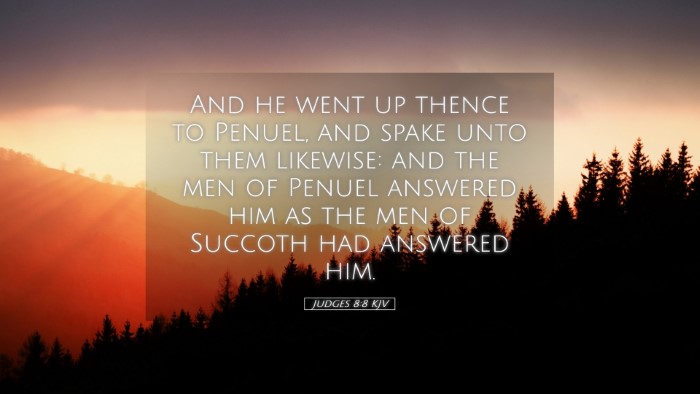Commentary on Judges 8:8
Judges 8:8 states:
"Then he went up from thence to Penuel, and spake unto them likewise: and the men of Penuel answered him as the men of Succoth had answered."
Introduction
This verse occurs in the context of Gideon's pursuit of Zeba and Zalumna, the kings of Midian, and reflects the challenges Gideon faced from his own countrymen. The hostility of the Israelites depicted here serves to highlight the themes of leadership, loyalty, and divine mandate.
Contextual Analysis
In the narrative, Gideon had just experienced a mighty victory over the Midianites. He sought assistance from the tribes of Ephraim, Succoth, and Penuel in his quest to capture the Midianite kings. However, he encountered resistance and lack of support from both Succoth and Penuel.
The Response of Penuel
The response of the men of Penuel mirrors the earlier response from Succoth, indicating a broader attitude among the Israelites during this tumultuous period. Despite being on the brink of victory, the apparent fear and hesitation of Gideon's fellow Israelites shows a lack of faith in God's plan.
Insights from Public Domain Commentaries
Below is a synthesis of insights from various public domain commentaries regarding this verse and its implications:
Matthew Henry's Commentary
Matthew Henry emphasizes the futility of doubt in the face of God's providence. He notes that Gideon's questions are met with scorn by the men of Succoth and Penuel, suggesting their refusal to support God's appointed leader. Henry argues this illustrates a serious lapse in faithfulness to God's call, revealing the divisions and doubts within Israel and the dangers of aligning with fear rather than faith.
Albert Barnes' Notes on the Bible
Albert Barnes explains that Gideon’s actions were motivated by a desire to demonstrate the victory wrought by God. The refusal of the townspeople to assist him underscores their lack of loyalty not just to Gideon, but to God’s overarching purpose for Israel. Barnes posits that such behavior reflects a broader theme of human resistance against divine authority, a recurrent motif in the book of Judges.
Adam Clarke's Commentary
Adam Clarke offers a deeper psychological perspective, analyzing the societal conditions that led to the fear exhibited by the men of Penuel. Clarke suggests that the fear of the Midianites had created a climate of self-preservation among the Israelites, which often superseded their destiny as a chosen people. He states this resistance to Gideon serves as a reminder of the human tendency to prioritize immediate safety over covenant faithfulness.
Theological Themes
This verse intersects with larger theological themes within the book of Judges and the entire narrative of the Old Testament, including:
- The nature of leadership: Gideon illustrates the challenges faced by leaders who are called to act in accordance with God's will, especially when confronted with disbelief or disloyalty.
- Community and faith: The reaction of both Succoth and Penuel signifies a communal failure to rally behind God's chosen leader, emphasizing the importance of corporate faithfulness.
- Human fear versus divine promise: The hesitation of the Israelite tribes highlights the repercussions of fear in the face of God’s promises and the need for a steadfast spirit among believers.
Application
For pastors and spiritual leaders today, this passage serves as a powerful reminder of the necessity for unwavering support and faith in God’s mission. The responses from the men of Penuel compel leaders to reflect on their approaches to guiding their congregations, particularly in times of uncertainty. It calls for an attitude of courage, urging believers to stand firm in faith, despite the prevailing fears of society.
Conclusion
Judges 8:8, while brief, encapsulates significant lessons concerning faith, leadership, and community loyalty. Commentators such as Matthew Henry, Albert Barnes, and Adam Clarke collectively highlight the urgency of addressing doubt and fear with the assurance of divine assistance and the collective responsibility of believers to support one another in pursuing God’s purposes.


